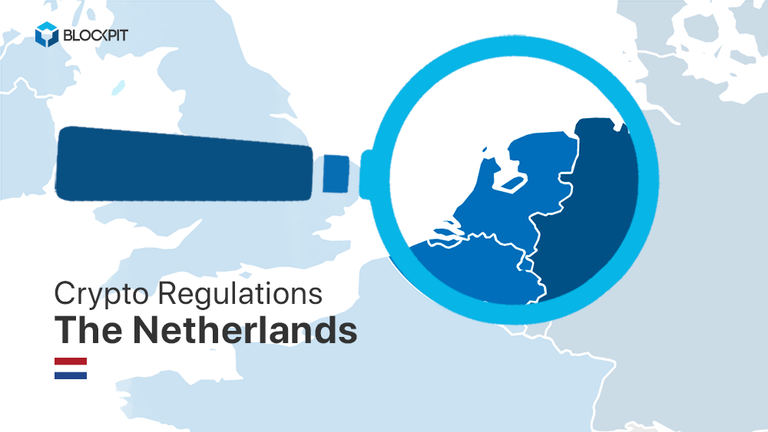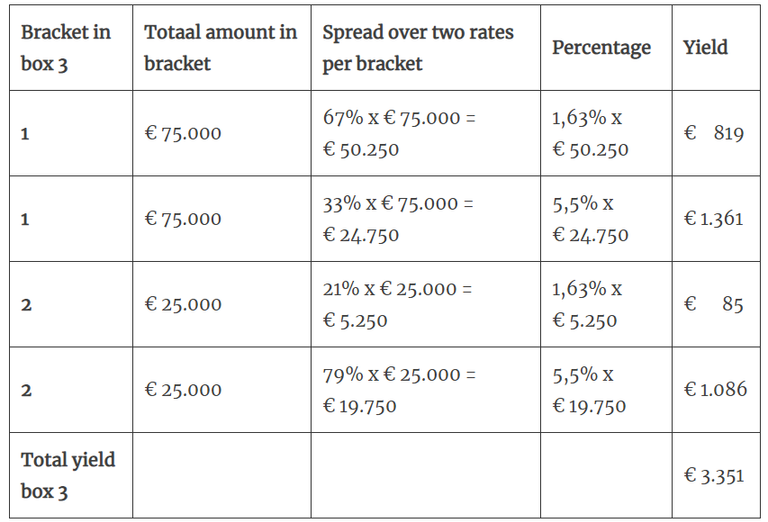
“If something wants to be treated as money, you have to be able to spend, save and calculate with it [...] So we do not consider it [cryptocurrency] to be money as such,” Petra Hielkema from the Dutch Central Bank states in a report in August 2018. As cryptocurrencies are not issued by a central body, they are not considered digital money under Dutch law. Instead the Dutch court considers cryptocurrencies to be a transferable value, making it equivalent to property.
Crypto taxation in the Netherlands
Depending on how cryptocurrencies are used, there are two different tax categories. In general, mining and trading, when considered as source of income, are taxed in box 1 of the income tax act. As this in most cases does not apply to privat individuals, cryptocurrencies in these cases are seen as assets and taxed in box 3 of the personal income tax act.
In box 3 not actual income received from savings and investment but an assumed return of investment on net assets (assets minus debts) is taxed. Net capital is determined once a year on 1st January. Valuated capital is then taxed with a 30% rate. In the table below you see how the assumed yield is valuated:

Here's an example:
You have € 125.000 savings and no debts in 2017. The tax free amount of € 25.000 is deducted, therefore € 100.000 are subject to taxation in box 3. As the amount exceeds bracket 1 of box 3, two brackets are used for calculation.

The total yield of box 3, in this example € 3.351, is then subject to a 30% tax rate, hence your tax amount is € 1.005,3. This example applies for privat persons.In terms of financial regulations, the dutch government took further steps. In July 2018, the Netherlands joined ‘The Joint Chiefs of Global Tax Enforcement,’ or ‘J5,' a coalition which tackles the issue of cryptocurrency-enabled crime such as money-laundering or tax evasion. Read more here: Tax Authorities enter the market.
ICO regulations in the Netherlands
Generally, ICOs are allowed in the Netherlands but the Dutch Authority for the Financial Markets (AFM) advises not to invest in initial coin offerings as they are currently "vulnerable to misrepresentation, fraud and manipulation". Nevertheless, the AFM states that this advice has to be seen seperatly from its perception of ICOs but is due to several risks because of increased popularity of ICOs.
Dutch banks on cryptocurrencies
As stated above, the Dutch Central Bank does not consider cryptocurrencies as real currencies and therefore does not see the adotption of cryptocurrency within DNB registered banks in the near future. Further dutch banks like Rabobank or ING also stay sceptical towards Bitcoin and Co. “With regards to companies that are active in the crypto market, we are very conservative,” Reusken, spokesman of ING admits and explains that ING does not provide any services itself to support people buying or selling cryptocurrencies. Nevertheless, financial institutions in the Netherlands are experimenting with blockchain technology, as for example ABN AMRO which is using the blockchain technology to manage escrow funds.
Disclaimer
The information provided in this blog post is for general information purposes only. The information was completed to the best of our knowledge and does not claim neither correctness nor accuracy. For detailed information on crypto regulations we recommend contacting a certified legal advisor in the specific country.
As this blog post referrs to international crypto laws, the content will only be available in English. If any questions occur, feel free to contact us in our Telegram Channel.
Visit the interactive map that shows information on cryptocurrency tax regulations!
Sources
- https://cryptodaily.co.uk/2018/08/dutch-central-bank-against-crypto-but-wont-move-to-regulate/
- https://cointelegraph.com/news/dutch-financial-regulator-has-doubts-about-crypto-investment-conformity
- https://www.mffa.nl/dutch-taxation-on-bitcoin-according-to-state-secretary-of-finance/?lang=en
- https://www.grantthornton.nl/en/insights-en/articles/bitcoin-hits-10000-dollar-what-about-cryptocurrency-and-taxes/
- https://www.orangetax.com/2016/09/box-3-tax-2017-no-1-2/
- https://cointelegraph.com/news/five-nations-launch-tax-enforcement-alliance-to-tackle-crypto-cybercrime-threat
- https://www.afm.nl/en/professionals/onderwerpen/ico
- https://www.reuters.com/article/us-crypto-currencies-bitfinex/ing-says-cryptocurrency-exchange-bitfinex-has-an-account-with-it-idUSKCN1G42MU?
- https://www.abnamro.com/en/newsroom/press-releases/2018/abn-amro-clearing-bank-develops-alternative-for-escrow-accounts.html
. . . . . . .
Stay up to date when it comes to crypto currencies and taxes. Visit us:
Telegram + Facebook + Twitter + LinkedIn +Reddit + Youtube
Originally published at blog.blockpit.io and cryptocurrency-tax.info
Good job.Want to see more posts on future.Good luck @rdnblogs
Thank you!
In addition to our https://cryptocurrency-tax.info , which is a global map with information on tax laws, a country-specific article will be published regularly on our blog: https://blog.blockpit.io/en/c/countries-and-crypto-laws We've created an interactive world map that shows information on cryptocurrency tax regulations for each country at the click of a button. Visit https://cryptocurrency-tax.info for more information!
Now the next question. How does it work if you have a webshop where you can pay in crypto? How do you know how much tax you need to pay?